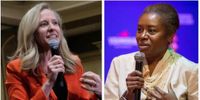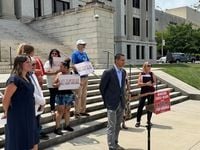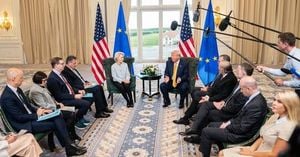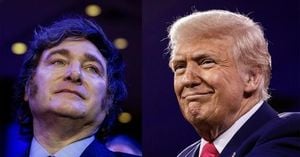As Virginia's 2025 elections approach, the political landscape is heating up with key races drawing intense attention across the state. From the lieutenant governor's race to the governor's contest, candidates are staking their claims with distinct policy positions and personal stories that resonate with voters, while polls and public opinion suggest a competitive and dynamic electoral season ahead.
In the race for lieutenant governor, Democratic State Senator Ghazala Hashmi is currently enjoying a solid lead over her Republican challenger, John Reid. According to a recent Commonwealth Poll released by Virginia Commonwealth University’s Wilder School, conducted between June 19 and July 3, Hashmi holds a 10-point advantage, securing support from 46% of registered voters compared to Reid's 36%. With a margin of error of 4.16 percentage points, this lead places Hashmi comfortably outside the statistical margin, signaling growing strength for the Democratic candidate.
Hashmi, who made history as the first Muslim woman elected to the Virginia Senate, has focused her campaign on issues that continue to resonate with Virginia voters, including reproductive rights, healthcare access, and public education. The poll also suggests that the broader political environment is contributing to her momentum, as prominent Republican figures like Governor Glenn Youngkin and former President Donald Trump face declining support among Independents and suburban voters.
Meanwhile, the gubernatorial race is drawing significant scrutiny, with Virginia Republicans expressing concerns about their candidate, Winsome Earle-Sears. Despite these worries, Governor Glenn Youngkin remains confident in the GOP's chances, stating, “Yeah, absolutely, I do, and I just want to again reiterate the fact that Virginia is soaring, and it has been the policies and leadership of Republican governor, lieutenant governor and attorney general that have been at the foundation of that.”
On the other side, Virginia Democrats are mobilizing vigorously, emphasizing the high stakes of the election. Lamont Bagby, Chairman of the Democratic Party of Virginia (DPVA), highlighted the importance of pushing back against both federal and state policies, stating, “Everyone knows that Virginia has the first opportunity to push back on what’s going on in Washington, but let’s be clear, it’s not just what’s going on in Washington. The leadership here in Virginia under the Youngkin-Earle-Sears administration has been deplorable.”
Polling data from Virginia Commonwealth University reflects this competitive environment. Democrat Abigail Spanberger leads Republican Winsome Earle-Sears with 49% support to 37% among registered voters. The poll also indicates that down-ballot races mirror the top-ticket dynamics, suggesting that the gubernatorial contest is influencing voter preferences across multiple offices.
Fundraising efforts further illustrate the intensity of the race. Spanberger reported a staggering $10.7 million haul in the second quarter, bolstering her campaign's financial strength. Earle-Sears’s campaign announced its “best single fundraising day” since launching in September, though it has not disclosed the amount raised publicly.
Adding depth to the gubernatorial contest, the special program “Chasing History: The Race for Governor” aired on July 24, 2025, offering viewers an intimate look at the candidates’ personal journeys and policy positions. The one-hour program featured in-depth interviews with Spanberger and Earle-Sears, highlighting how their life experiences shape their political perspectives.
Spanberger was interviewed at Tech for Troops, an organization dedicated to helping veterans acquire computer skills. She expressed enthusiasm about supporting veterans, saying, “It’s an organization that I first became aware of when I was first elected to Congress.” In contrast, Earle-Sears spoke at a Veterans of Foreign Wars (VFW) event in McLean, emphasizing her Marine Corps background: “Well, you know, I am a Marine. And you know what they say. Once a Marine, always a Marine. And this is my people.”
Both candidates addressed practical issues such as the contentious car tax. Spanberger acknowledged the difficulties in repealing it, while Earle-Sears argued that Virginia has sufficient funds to tackle the problem.
The program also revealed poignant personal stories. Earle-Sears shared a heartbreaking memory of losing her daughter and granddaughters in a car accident, a tragedy that informs her outlook. Spanberger reflected on her early jobs and how they shaped her understanding of labor and workers’ rights. The show also explored the impact of federal employment on Virginia’s economy, providing voters with a comprehensive view of the candidates beyond traditional campaign rhetoric.
In the city of Roanoke, Virginia Democrats have vocally opposed Earle-Sears’s gubernatorial bid, citing concerns over her policy positions. At a press conference, Delegate Sam Rasoul and candidates Donna Littlepage and Lily Franklin criticized Earle-Sears’s support for federal tax bills that would reduce Medicare, cause job losses, lead to local hospital closures, and slash education funding.
Delegate Rasoul pointed out the district’s heavy reliance on Medicaid, stating, “Having the fourth-highest Medicaid utilization rate in Virginia in this district, and having a school district that is so reliant on making sure we are taking care of the most vulnerable students, we clearly need leadership that’s going to stand by Roanokers and that’s going to stand by Virginians.”
Supporters of Spanberger emphasized her focus on Medicaid and lowering drug costs. Donna Littlepage noted, “She understands what’s happening to Medicaid, and she understands we’re going to have to look on how we spend those dollars further, and how we keep as many people insured as we can.”
Local residents have also voiced their concerns. Roanoke resident Sarah Goodman criticized Earle-Sears’s vote against contraception rights as “unconscionable,” expressing disbelief that a woman could take such a stance.
In response, Earle-Sears defended her record and vision, asserting, “I am for all forms of education, and my opponent says, ‘One type of education only, unless you have the ability that you can make a different decision.' I want everybody to have options when it comes to schooling, so that would be public school, private school, parochial school, homeschool, hybrid, whatever you as the parent wants.”
As the November 4, 2025, election date draws near, Virginia voters face a clear choice between candidates who represent contrasting visions for the state's future. The lieutenant governor’s race and the gubernatorial contest both reflect broader national debates on healthcare, education, and economic policy, with personal narratives adding layers of complexity.
Interestingly, the last time Virginians voted to split their ticket was in 2005, when Democrat Tim Kaine was elected governor while Republican Bill Bolling won the lieutenant governor’s race. Whether history will repeat itself remains to be seen, but the current polls and campaign dynamics suggest a fiercely contested election season ahead.
With voter engagement surging and campaigns intensifying, Virginia’s 2025 elections promise to be a defining moment for the Commonwealth, shaping its policies and leadership for years to come.





